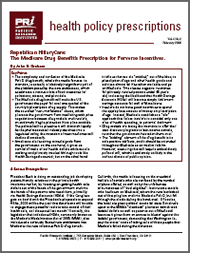Imagine that you were inspecting a swimming pool that was cracked and leaking water, such that anyone who dove into it would be at risk of cracking his head on the bottom. You would likely make it a priority to fix the pool. However, if the pool were on a cruise ship, which had a cracked hull and was taking on water, such a priority would obviously be misplaced. Ignoring the ships hull in favor of the pool would be utterly irresponsible. Nevertheless, this is what the U.S. Senate has proposed in its federalization of Medicaid, the joint federal-state program for low-income Americans.
National Medicaid spending, per capita, has increased one-third faster than private medical spending between 1970 and 2008. The current financing mechanism is already burdened with a number of bad incentives such as the Federal Medical Assistance Percentage (FMAP), the federal formula that encourages each state to spend its own taxpayers money irresponsibly in order to maximize its take from other states. For example, Californias FMAP was traditionally the 50 percent minimum: For every dollar California spent, the U.S. Treasury would kick in one dollar. However, the FMAP is supposed to give more federal dollars to states with more poor people. So, Mississippi has had the highest FMAP, 75.67 percent: For every dollar Mississippi spent on Medicare, the U.S. Treasury would kick in $3.11.

